Hair loss is a common concern for men of all ages, affecting confidence and self-image. Many factors, including genetics, stress, and nutrition, contribute to hair thinning. The good news is that there are products specifically designed to combat hair loss and promote healthier, thicker-looking hair. Hair loss shampoo and conditioners are formulated to maintain scalp health and minimize shedding. These shampoos and conditioners are specifically formulated to keep hair in the longest growth stage possible.
This blog post will cover the science behind these products, explain their effectiveness, and highlight the top hair loss shampoo and conditioners in 2025. Whether you’re just noticing thinning hair or seeking to maintain your mane, this comprehensive guide will help you make informed choices.
What Are These Shampoos and Conditioners?
Shampoos and conditioners for hair loss are specialized hair care products that support hair growth, improve scalp health, and reduce hair breakage. Unlike regular shampoos and conditioners, these products often include active ingredients that address the underlying causes of hair thinning, such as:
- DHT Blockers: Dihydrotestosterone (DHT) is a hormone linked to androgenic alopecia (male pattern baldness). Many hair loss products contain natural or synthetic compounds that inhibit DHT.
- Scalp-Conditioning Agents: A healthy scalp is essential for hair growth. These products may include ingredients like tea tree oil, salicylic acid, or menthol to reduce inflammation, clear clogged follicles, and promote circulation.
- Nutrient-Rich Formulas: Vitamins, amino acids, and proteins are often included to strengthen hair and encourage regrowth.
How Do Hair Loss Shampoo and Conditioners Work?
The primary goals of these products are to cleanse the scalp, nourish the hair follicles, and create an optimal environment for hair growth. Here’s how they achieve this:
- Cleansing the Scalp: The buildup of oils, dead skin cells, and product residue can clog hair follicles, impeding growth. Hair loss shampoos often contain gentle cleansers to remove debris while maintaining scalp health.
- Reducing Inflammation: Scalp inflammation can contribute to hair loss. Ingredients like niacinamide, zinc, or aloe vera soothe irritation and reduce redness.
- Stimulating Hair Follicles: Caffeine, peppermint oil, and other stimulants boost blood circulation to the scalp, delivering oxygen and nutrients to the follicles.
- Strengthening Existing Hair: By fortifying the hair shaft with keratin, biotin, or collagen, these products minimize breakage and make the hair appear fuller.
- Inhibiting DHT: As DHT can shrink hair follicles and shorten the growth phase, shampoos with DHT-blocking ingredients can slow hair loss.
Why Should Men Use Hair Loss Shampoos and Conditioners?
For men experiencing hair thinning, investing in the right hair care products is a proactive step toward maintaining a full, healthy head of hair. Here’s why these products are essential:
- Non-Invasive Solution: Unlike hair transplants or laser treatments, shampoos and conditioners offer a low-risk, convenient option to address early-stage hair loss.
- Boosting Confidence: Thicker, healthier hair can enhance self-esteem and reduce anxiety about hair loss.
- Improved Scalp Health: These products address underlying scalp issues that may exacerbate thinning, such as dandruff, excess oil, or clogged follicles.
- Compatibility with Treatments: They can complement other hair loss treatments, such as minoxidil or finasteride, enhancing overall results.
- Preventive Care: Even if you’re not experiencing noticeable hair loss, these products can be preventive, especially for those with a family history of baldness.
Top 5 Shampoos and Conditioners for Hair Loss in 2025
With countless options on the market, it can be challenging to identify the best products. We have compiled a list of the top five shampoos and conditioners for hair loss in 2025. Plus, we are highlighting their pros and cons.
1. Nioxin System 2 Cleanser and Scalp Therapy Conditioner
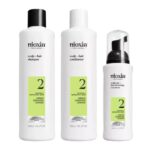
Overview: Nioxin is a well-known brand for thinning hair. Their System 2 is designed specifically for noticeably thinning, fine hair. It works to cleanse the scalp, reduce hair breakage, and create a foundation for stronger hair growth.
Key Ingredients: BioAmp, Scalp Access Delivery System, and Glyco-Shield
Pros:
- Targets DHT buildup
- Improves scalp health with antioxidants and botanicals
- Noticeable thickening effect after prolonged use
- Widely available and affordable
Cons:
- It may cause dryness for some users and require a good leave-in treatment
- Results take several months to appear
Nioxin products are our Men’s Grooming Expert and Master Men’s Hairstylist’s favorite men’s hair loss shampoo and conditioner!
2. Aveda Invati Advanced Exfoliating Shampoo and Thickening Conditioner
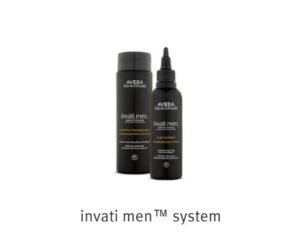
Overview: Aveda’s plant-powered Invati Advanced system is crafted with 94% naturally derived ingredients. It’s perfect for men looking for a more natural approach to hair loss prevention.
Key Ingredients: Turmeric, ginseng, and salicylic acid
Pros:
- Will gently exfoliate the scalp to unclog pores
- Leaves hair feeling thicker and healthier
- Eco-friendly and cruelty-free brand
- Pleasant, natural scent
Cons:
- Premium pricing
- It may not deliver substantial DHT-blocking benefits
3. Keeps Thickening Shampoo and Conditioner
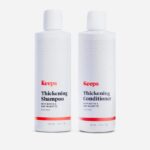
Overview: Designed specifically for men dealing with early-stage hair loss, Keeps offers a straightforward, effective formula. Their shampoo focuses on removing DHT and maintaining scalp health.
Key Ingredients: Biotin, saw palmetto, and caffeine
Pros:
- Affordable and subscription-based
- Minimalist, no-frills formula designed for men
- Improves hair texture and strength over time
Cons:
- Lacks the luxurious feel of high-end products
- Limited availability outside the subscription model
4. Pura D’Or Original Gold Label Anti-Thinning Shampoo and Conditioner
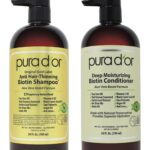
Overview: Pura D’Or is a popular choice for those seeking a natural yet effective solution to hair thinning. It features a blend of organic ingredients and herbal extracts to promote hair health.
Key Ingredients: Argan oil, nettle extract, and biotin
Pros:
- Free from harsh chemicals like sulfates and parabens
- Gentle on sensitive scalps
- Suitable for all hair types
- Affordable
Cons:
- Results may be subtle for advanced hair loss
- Conditioner may not provide enough moisture for very dry hair
5. Ultrax Labs Hair Surge Caffeine Shampoo
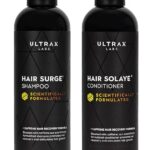
Overview: Ultrax Labs Hair Surge is a caffeine-powered shampoo that stimulates hair follicles and supports healthy hair growth. It’s ideal for men seeking a targeted treatment.
Key Ingredients: Caffeine, ketoconazole, and saw palmetto
Pros:
- Focuses on stimulating hair growth
- High concentration of active ingredients
- It can be paired with other hair loss treatments
Cons:
- Higher price point
- It may cause dryness if not followed by a good conditioner
How to Choose the Right Hair Loss Products
When selecting a shampoo and conditioner for hair loss, consider the following factors:
- Goals and Expectations: Know your goal for using a hair loss shampoo and conditioner. Do you want to slow excessive hair shedding or regrow hair? Each shampoo has specific features and benefits. Set reasonable expectations. It takes time for these types of products to see results. Expect three months of use before seeing slowed hair shedding and six months for hair regrowth to occur.
- Hair Type: Ensure the product suits your specific hair type (e.g., oily, dry, fine, or thick).
- Ingredients: Look for DHT blockers, scalp-conditioning agents, and nourishing ingredients that align with your needs.
- Scalp Sensitivity: Opt for sulfate-free, gentle formulas if you have a sensitive scalp.
- Lifestyle: If you prefer eco-friendly or natural products, brands like Aveda or Pura D’Or may be ideal.
- Budget: Determine how much you’re willing to invest and balance price with efficacy.
Key Ingredients to Look for in Hair Loss Shampoos and Conditioners
The effectiveness of hair loss shampoos and conditioners lies in their ingredients. Specific components are known to address hair thinning and promote healthy scalp conditions. Here is a breakdown of the most beneficial ingredients and how they work:
1. DHT Blockers
DHT (dihydrotestosterone) primarily contributes to male pattern baldness. It shrinks hair follicles and shortens the hair growth cycle. Ingredients that block or inhibit DHT are crucial for combating hair loss.
- Saw Palmetto: A natural extract that reduces DHT levels by inhibiting the enzyme 5-alpha-reductase.
- Ketoconazole: This is an antifungal ingredient with mild DHT-blocking properties that also combats scalp inflammation.
2. Caffeine
Known for its stimulating properties, caffeine enhances blood circulation to the scalp, promoting nutrient delivery to hair follicles. It can also prolong the anagen phase (a.k.a growth phase) of the hair cycle, encouraging thicker hair.
3. Biotin (Vitamin B7)
Biotin is essential for producing keratin. This is a key structural protein in hair. While biotin deficiency is rare, this ingredient fortifies the hair shaft, reduces breakage, and enhances overall hair strength.
4. Niacin (Vitamin B3)
Niacin improves blood flow to the scalp, ensuring hair follicles receive adequate oxygen and nutrients. It also strengthens the scalp’s natural barrier to retain moisture and reduce dryness.
5. Amino Acids and Proteins
Proteins like keratin, collagen, and silk proteins reinforce the hair shaft, making it more resilient against breakage. Amino acids, the building blocks of proteins, are essential for healthy hair growth.
6. Salicylic Acid
Salicylic acid is an exfoliant, clearing away dead skin cells and excess oils that can clog hair follicles. This creates an optimal environment for hair growth while reducing conditions like dandruff.
7. Essential Oils
Natural oils nourish the scalp and provide antimicrobial and anti-inflammatory benefits.
- Peppermint Oil: Stimulates blood flow to the scalp and provides a cooling sensation.
- Tea Tree Oil: Has antifungal properties that keep the scalp clean and healthy.
- Rosemary Oil: Known for its potential to improve hair density and reduce shedding.
8. Zinc PCA
This ingredient regulates sebum production, which benefits men with oily scalps. It also has antibacterial properties that prevent scalp irritation.
9. Aloe Vera
Aloe vera is widely recognized for its soothing and moisturizing properties. It calms irritated scalps, reduces inflammation, and enhances overall scalp health.
10. Panthenol (Provitamin B5)
Panthenol acts as a humectant, drawing moisture into the hair and scalp. It helps improve the elasticity of hair strands, reducing breakage.
Ingredients to Avoid in Hair Loss Shampoos and Conditioners
While certain ingredients promote hair health, others can be detrimental. Especially for men experiencing thinning hair or scalp sensitivity. Here is a list of ingredients to avoid:
1. Sulfates (Sodium Lauryl Sulfate and Sodium Laureth Sulfate)
Sulfates are common cleansing agents that create a rich lather. However, they can strip the scalp of natural oils, leading to dryness and irritation. For men with sensitive scalps or hair loss, sulfate-free products are a better choice.
2. Parabens
Parabens are preservatives used to extend the shelf life of hair products. Studies have suggested they may disrupt hormonal balance, potentially exacerbating hair loss in men. Opt for paraben-free formulations whenever possible.
3. Silicones
While silicones like dimethicone and cyclopentasiloxane make hair feel smooth and shiny. They can create buildup over time, clogging hair follicles and impeding growth. Look for products labeled as “silicone-free.”
4. Artificial Fragrances
Synthetic fragrances often contain a mix of undisclosed chemicals that can irritate the scalp. Choose products with natural scents derived from essential oils or labeled “fragrance-free.”
5. Alcohols
Certain alcohols, such as isopropyl alcohol and ethanol, can dry out the hair and scalp. Making them less suitable for men experiencing hair thinning. However, not all alcohols are harmful. Fatty alcohols like cetyl alcohol and stearyl alcohol are beneficial for moisturizing.
6. Formaldehyde-Releasing Preservatives
Ingredients like DMDM hydantoin, imidazolidinyl urea, and quaternium-15 release small amounts of formaldehyde. Formaldehyde can irritate the scalp and potentially weaken hair over time.
7. Mineral Oil and Petrolatum
While these ingredients are often used as emollients, they can create a barrier that traps debris and hinders scalp breathability. Making them less ideal for hair loss products.
8. Harsh Detergents
Ingredients like ammonium lauryl sulfate and ammonium laureth sulfate are harsh detergents that can lead to scalp dryness and irritation.
9. Synthetic Dyes
Artificial colorants serve no functional purpose in hair care products and can sometimes cause allergic reactions or sensitivity in the scalp.
Choosing Wisely for Healthy Hair
Understanding the ingredients in hair loss shampoo and conditioners is essential for making informed decisions. Men can take a significant step toward healthier, thicker hair by choosing products with beneficial components. Selecting products with DHT blockers, caffeine, and biotin while avoiding harsh sulfates, parabens, and synthetic additives is a plus.
When evaluating products, always read labels carefully. Consider your hair type and scalp condition, and consult a dermatologist if unsure. Combining a high-quality shampoo and conditioner with a healthy lifestyle and other hair loss treatments can make a noticeable difference in your hair’s health and appearance. Taking control of hair loss starts with knowledge. This blog post can equip men to make the best choice for their hair care routine in 2025 and beyond.
Statistics on Men’s Hair Loss and Its Main Causes
Hair loss is a widespread issue that affects millions of men worldwide. Making it one of the most common cosmetic and psychological concerns among men. Understanding the prevalence and causes of hair loss can help men identify their risk factors and seek appropriate solutions.
Hair Loss Statistics
Prevalence Among Men
- By the age of 35, approximately 66% of men experience some degree of hair loss.
- By the age of 50, 85% of men have significantly thinning hair.
- Male pattern baldness (androgenic alopecia), the most common form of hair loss, affects around 50 million men in the United States alone.
Age and Hair Loss
- Hair loss becomes more common and severe with age.
- 25% of men who suffer from hereditary male pattern baldness start losing their hair before the age of 21.
Psychological Impact
- Studies show that up to 60% of men experiencing hair loss report reduced self-confidence.
- Many men with hair loss report increased levels of anxiety and depression, demonstrating the significant psychological impact of this condition.
Global Perspective
- Globally, it is estimated that 50-70% of men will experience some degree of hair loss in their lifetime, with rates varying based on genetic and environmental factors.
Citations:
Main Causes of Hair Loss in Men
A variety of factors can cause hair loss. Factors include genetics, hormonal changes, medical conditions, and lifestyle. Below are the primary contributors:
Androgenic Alopecia (Male Pattern Baldness)
- Cause: A genetic condition caused by sensitivity to dihydrotestosterone (DHT), a byproduct of testosterone.
- Mechanism: DHT binds to receptors in the hair follicles, shrinking them over time. This results in shorter growth cycles and progressively thinner hair.
- Prevalence: Accounts for 95% of hair loss cases in men.
Stress-Induced Hair Loss (Telogen Effluvium)
- Cause: Physical or emotional stress disrupts the hair growth cycle, pushing more hairs into the resting (telogen) phase.
- Triggers: Illness, surgery, major life changes, or psychological stress.
- Reversibility: Typically temporary if the underlying cause is addressed.
Nutritional Deficiencies
- Common Deficiencies:
- Iron: Essential for oxygen delivery to hair follicles.
- Zinc: Important for tissue growth and repair.
- Biotin: Supports keratin production.
- Dietary Impact: Poor diet or restrictive eating habits can lead to hair thinning.
Medical Conditions
- Alopecia Areata: This autoimmune disorder occurs when the immune system attacks hair follicles, causing patchy hair loss.
- Thyroid Disorders: Both hypothyroidism and hyperthyroidism can disrupt hair growth cycles.
- Scalp Infections: Conditions like ringworm or folliculitis can damage the scalp and hair follicles.
Medications and Treatments
- Drugs That Cause Hair Loss:
- Chemotherapy: Affects rapidly dividing cells, including hair follicles.
- Beta-blockers and blood pressure medications.
- Antidepressants and anti-seizure drugs.
- Mechanism: These medications can disrupt hair growth cycles or lead to telogen effluvium.
Lifestyle Factors
- Smoking: Reduces blood flow to hair follicles, depriving them of essential nutrients.
- Alcohol Consumption: This can lead to dehydration and nutrient deficiencies, impacting hair health.
- Excessive Styling: Overusing heat tools, chemical treatments, or tight hairstyles (traction alopecia) can weaken hair.
Hormonal Changes
- Post-Puberty Hormonal Shifts: Increased androgen levels can exacerbate genetic hair loss.
- Conditions like Low Testosterone: May impact hair growth indirectly.
Environmental Factors
- Pollution: Scalp exposure to pollutants may cause oxidative stress, leading to hair follicle damage.
- Hard Water: High mineral content in water can lead to scalp buildup and hair brittleness.
Why Understanding the Causes Matters
Knowing the root causes of hair loss helps men take the right preventive or corrective measures. For instance:
- Those with androgenic alopecia may benefit from DHT-blocking hair loss shampoo or medications like finasteride.
- Stress-related hair loss might improve with lifestyle changes and stress management techniques.
- Nutritional deficiencies can be addressed with dietary supplements.
By identifying the cause of hair loss early, men can choose tailored solutions to maintain and restore hair health.
Citations:
Final Thoughts on Hair Loss Shampoo
Hair loss shampoo and conditioners designed for hair loss are invaluable tools for men looking to maintain or restore their hair. By incorporating the right products into a routine, men can improve scalp health, strengthen their hair, and slow the progression of thinning. While results vary, consistency is key! Most products require several months of regular use to show significant benefits.
Whether you choose Nioxin, Aveda Invati, or another top-rated option, taking action today can make all the difference in preserving your hair tomorrow. Evaluate your specific needs, consult a dermatologist or men’s hairstylist specializing in hair loss, and commit to a hair care routine tailored to your goals. With the right approach, fuller, healthier hair is within reach.
